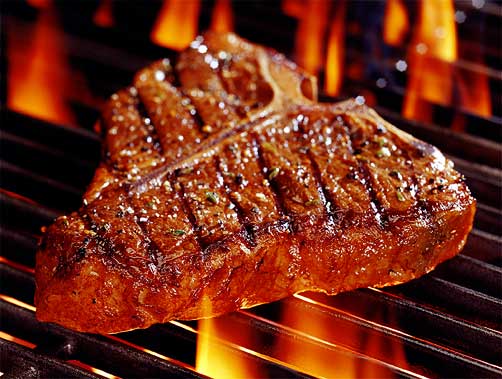
Carnitine, found in red meat and some energy drinks, has been linked to cardiovascular disease in a new study.
Consuming lots of red meat has long been thought to increase the chances of developing cardiovascular diseases. Researchers now believe they have evidence that a molecule called carnitine found in red meat is likely a key player in the link between the two. From The New Scientist:
Some bacteria in the intestine use carnitine as an energy source, breaking it down and producing a waste product called trimethylamine (TMA). The liver converts this into another substance, trimethylamine-N-oxide (TMAO), which is excreted in urine.
In mice, high levels of dietary carnitine shifted the types of bacteria present in the gut and increased the volume of TMAO produced tenfold. “Imagine a Petri dish full of bacteria,” says Hazen. “If you start feeding them carnitine, the ones that like carnitine more will reproduce and those that don’t will decrease.”
TMAO levels matter because the substance increases the uptake of “bad” cholesterol and prevents its destruction by macrophages – white blood cells – in artery walls. This causes a build-up of plaque that can lead to atherosclerosis.
In further tests, Hazen’s team found that meat-eaters produced higher levels of TMAO than vegans or vegetarians after they were fed carnitine, suggesting that they had more TMA-producing bacteria in their gut. “I’m not telling people to cut out red meat,” Hazens says. “But cut down the frequency and portion sizes.”
As a check, the researchers looked at the blood levels of carnitine and TMAO in human blood samples and determined whether there was a link to cardiovascular disease. And there was. From Scientific American:
[E]ven when they took l-carnitine supplements, vegans and vegetarians made far less TMAO than meat eaters. Fecal studies showed that meat eaters and non-meat eaters also had very different types of bacteria in their guts. Hazen says that a regular diet of meat probably encourages the growth of bacteria that can turn l-carnitine into TMAO.
To further make the case, researchers checked the levels of l-carnitine in the blood of nearly 2,600 people who were having elective heart check-ups. By itself, the nutrient didn’t seem to make a difference. However, people who had high levels of both l-carnitine and TMAO were prime targets for heart disease, further evidence that it’s the bacterial alchemy — not the l-carnitine alone — that poses the real threat.
The original research is published in Nature Medicine.
Comments are closed.